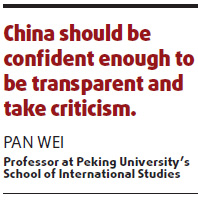

|
Chinese consumers had worried that the Green Dam software could violate their rights to freely search the Internet as adults. CFP |
It is not often in China that a government minister softens his stance on a national order.
But Minister of Industrial and Information Technology (MIIT) Li Yizhong did that when he announced that the government's Green Dam computer software mandate was "not thoughtful enough".
The minister said at an Aug 13 news conference that the use of the software developed to filter out online pornography would "depend on consumers".
The phrase represented a significant departure from the government's orders in May that instructed computer makers to include the software on all computers sold in China.
Li stressed that the goal was still to protect children from online pornography.
"Any move to politicize the issue or to attack China's Internet management system is irresponsible and not in line with reality," the minister said.
His statement ended months of domestic controversy and complaints about Internet control from overseas governments and business organizations.
Li Chengyan, a professor at Peking University, said MIIT apparently had taken the objections seriously.
"I am glad to see that the minister has admitted to the ministry's mistake and explained what happened in order to clear up any misunderstanding," Li Chengyan said.
"That's doesn't happen in China that often," he added.
Consumer voices
Chinese consumers had worried that the Green Dam software could violate their rights to freely search the Internet as adults.
They also were concerned that potential bugs in the software would expose their systems to costly computer viruses.
It is the first time that Chinese consumers have stepped up in organized groups to protest government efforts to control the Internet.
After the order was reported by the US-based Wall Street Journal in June, consumers, media and online bloggers rallied to protest the government's decision.
Some consumers discovered that the Green Dam software would filter out images of Garfield, a cartoon cat with orange skin, but not filter out pictures of young women posing provocatively in skimpy dresses.
The controversy reached a climax when the media later reported that the government planned to spend 40 million yuan to purchase the software from Zhengzhou Jinhui Computer System Engineering and Beijing Dazheng Human Language Technology Academy.
Concerns about computer viruses turned to worries about potential bribery and corruption.
An announcement made by the Ministry of Finance in late June claiming that it was not involved in the purchase of Green Dam further increased consumers' worries.
Domestic concerns were joined by protests from abroad. The US government joined 22 international business chambers of commerce that sent letters urging China's government to reconsider its mandate.

MIIT in June had announced a delay of the installation of Green Dam software originally scheduled for July. The government explained that computer producers were demanding more time for such a massive installation.
Still, MIIT defended its policy. MIIT officials told the Xinhua News Agency that the filtering software was "an act for the public good" and added that the software conforms to "World Trade Organization (WTO) rules".
The statement about the WTO apparently was in response to suggestions that the Green Dam order might be a violation of WTO rules.
Even though use by consumers now is voluntary, MIIT still will install Green Dam filters in schools and Internet cafes.
Relieved PC makers
The government's softer stance is a relief to computer makers.
During the past few months, Dell, Hewlett-Packard, Lenovo and other computer makers had been wary about how to achieve a balance between not upsetting the government and not upsetting consumers.
A source at a foreign computer company who asked that his name not be used said the controversy left computer makers feeling trapped between answering the government and consumers in the world's second-largest PC market.
"In our company, we had a rule that would not allow installing software in our products without a complete test for security and compatibility," the source said.
"We might face complaints and compensation demands from the consumers if the pre-installed software has problems or does damage to the hardware," the source said.
In June, a group of US professors at the University of Michigan reported the Green Dam software was vulnerable to outside computer hackers.
US-based software developer Solid Oak also threatened to sue Green Dam's Chinese developers for copyright infringement over Sold Oak's porn filter called CyberSitter.
Internet controls
The Chinese government this year has tightened controls over the Internet due to safety concerns over the upcoming celebration of the 60th anniversary of the nation.
The government also has launched several anti-pornography campaigns targeting the Internet in recent months.
The government temporarily shut down access to Google in June after reports that the popular Internet search engine was providing links to pornographic content.
The government also blocked access to the Internet social networking tool Twitter following riots in the Xinjiang Uygur autonomous region in July that killed at least 140 people. Internet access also was blocked in the immediate area of the riots.
Pan Wei, a professor at Peking University's School of International Studies, said China should be more open to other voices on monitoring the Internet.
"China should be confident enough to be transparent and take criticism. It's about time China loosened its control over the Internet," Pan said.
Cui Jia contributed to the story
(China Daily 08/24/2009 page1)













